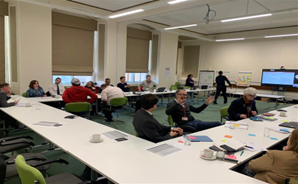
Developing the Birmingham Data Charter

Work is underway to develop a Birmingham Data Charter. The charter will set out the principles for making data open, accessible and useful to city stakeholders – in a way that is ethical and safe.
The first workshop was held on 26 January 2023, where Director of Strategy, Equality & Partnerships, Richard Brooks, outlined the purpose of the Data Charter:
‘’We have two main priorities for this work. Firstly, to stimulate and support collaboration which generates value for our citizens, secondly, build trust amongst partners who want to share data, value and insight, so that we can collectively solve key policy challenges.’’
Development of the charter is being facilitated by Associate Professor Rebecca Riley from City-REDI at the University of Birmingham with support from Birmingham City Council. Two workshops have been held to gather ideas from a variety partners from the public, private, voluntary and community sector: Arcadis, Birmingham Voluntary Service Council (BVSC), Department for Work and Pensions (DWP), Greater Birmingham Chambers of Commerce, National Express, National Grid, NHS, St Basils, Trowers & Hamlins, University of Birmingham, Virgin Media, West Midlands Combined Authority and West Midlands Police.
The first workshop focussed on learning from good practice, with Theo Blackwell, Chief Digital Officer for London from the Greater London Authority (GLA) sharing details of the Emerging Technology Charter for London and the London Datastore, a free and open data-sharing platform, which has been operational since 2010. Since inception, the platform has hosted 2000 datasets, 1 million users, 1 million dashboards and secured 2 million page views from the public and businesses.
Theo shared tips on how vital it is for the Birmingham Data Charter to:
- Develop an eco-system and have a dedicated team who engage with this system
- Provide decision makers with evidence to make bolder decisions
- Use the platform as an enabler for more effective use of city funds
- Support the data charter with an effective data strategy
- Build a community of practice who can identify shared problems and develop solutions to them
Andrew McMillan & Chris Martin from Pinsent Masons also provided their perspective. They led on the early stages of developing the London Data Charter. Andrew and Chris outlined how important it is to have:
- A ‘shared purpose and set of principles’ which underpin the data charter
- To ‘build trust’ and remain transparent, and that
- The charter should seek to be a ‘living’ document which is regularly updated through feedback from partners
A second workshop was held on 21 March 23, partners discussed the emerging principles for the data charter and ways in which we could jointly operationalise the charter through developing joint insight to address key policy challenges.
The result of these workshops is a set of emerging principles:
|
Principle |
Details |
|
The Birmingham Data will help partners produce analysis to benefit the citizens of Birmingham and the wider West Midlands region - reflecting the diversity of our communities of place, communities of identity, and communities of experience. |
|
Insight will be focussed on addressing Birmingham’s Grand Challenges, promoting equity in service provision and addressing structural inequality. |
|
Data sharing will be conducted ensuring that personal information is protected and sensitive information secure. |
|
Public, private, voluntary and community sector organisations will collaborate and innovate – fostering a thriving insight community in Birmingham. |
|
Where safe and ethical, partners will publish our own data and insight, allowing partners to access and analyse. |
|
Maintain an approach to responsible collection, use, and sharing of data whilst enabling production of insight that will benefit our citizens. |
|
We will share our learning and contribute to data analysis and skills development of other organisations in Birmingham and the wider West Midlands region. |
|
Data and insight we generate under the data charter will be published on the Birmingham City Observatory as a focal point to disseminate findings. |
|
The data charter will be a living document – regularly reviewed and updated by partners to ensure it facilitates analysis using increasing volumes of available data and new technologies. |
The next step will be to test these principles through undertaking some joint analysis in workshop / hackathon events to generate insight into specific joint areas of interest – for example the Cost of Living crisis and Climate Emergency. These sessions are being planned and will take place in the coming weeks.
Get involved!
This is a data charter for Birmingham, please get involved if you would like to contribute or get more details about the work -for example
- Do you have any comments, feedback or ideas on how we are developing the Birmingham Data Charter?
- What do you think about the emerging principles identified above? – are they clear? Is anything missing?
- Could a charter help your organisation achieve better outcomes for our citizens? If, yes, how?
- Support the data charter with an effective data strategy
- Are you working on specific policy challenges where you want to share / access data from different partners across the city / wider West Midlands region?
To contact us, please email: cityobservatory@birmingham.gov.uk
Written by Richard Smith, Head of Insight, Policy & Strategy
 Birmingham Pakistani Community Profile
Birmingham Pakistani Community Profile



